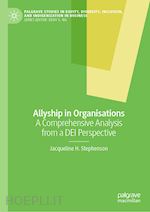
Questo prodotto usufruisce delle SPEDIZIONI GRATIS
selezionando l'opzione Corriere Veloce in fase di ordine.
Pagabile anche con Carta della cultura giovani e del merito, 18App Bonus Cultura e Carta del Docente
This book provides a comprehensive analysis of the issues surrounding allyship as one of the tools in the arsenal of organisational leaders to further advance the goal of diversity, equity and inclusion (DEI) in organisations. It extends the existing literature on allyship, which has predominantly focused on allyship in the context of gender and racial inclusion. It specifically addresses allyship concerns within organizations that are striving for DEI. The chapters explore various models of allyship, delving into the antecedents, moderators, mediators, and organizational outcomes associated with effective allyship in the pursuit of DEI goals.
This text critically examines the concept of allyship in the context of discrimination faced by various groups, including but not limited to under-researched populations such as persons with disabilities and individuals from the lesbian, gay, bisexual, and queer (LGBQ) community. By extending the understanding of human resource practitioners and academic theorists in these underexplored but crucial areas, it sheds light on the role of organisational allies in addressing discrimination and supporting marginalized groups. Additionally, it delves into the involvement of organisational allies in adjudicated discrimination cases, further enriching the discourse on allyship and its practical applications.
Providing a comprehensive review of the salient issues surrounding allyship within organisations and the extent to which this can be an efficacious approach in promoting and developing more inclusive and diverse contemporary organisations, this work will prove useful to researchers in facilitating the delivery of contemporary data, literature and analysis as it relates to the current challenges faced by disadvantaged employees and job seekers and how lenses through which they are perceived, may be prejudicial.
CHAPTER 1 Understanding the role of allyship as a tool for organisational diversity, equity and inclusion.- CHAPTER 2 Privilege and performative allyship within organisations.- CHAPTER 3 Intersectionality and organisational allyship.- CHAPTER 4 Pitfalls and barriers of allyship at work.- CHAPTER 5 Effective organisational allyship behaviours, policies, and practices.- CHAPTER 6 Can I just be me? - Sexual orientation and allyship at work.- CHAPTER 7 Nothing for us, without us! – Workplace allyship and employees with disabilities.- CHAPTER 8 Investigating organisational allyship – Evidence from jurisprudence.- CHAPTER 9 Allyship, social and organisational change.- CHAPTER 10 Allyship, diversity, equity and inclusion – The way forward.
Jacqueline H. Stephenson is Lecturer in the Department of Management Studies at the University of the West Indies,Trinidad and Tobago. Her research interests include discrimination, equality and inclusion at work; diversity within contemporary workplaces; underrepresentation, advocacy and the efficacy of anti-discrimination legislation; and inequities, exclusion and discrimination in the Anglophone Caribbean.











Il sito utilizza cookie ed altri strumenti di tracciamento che raccolgono informazioni dal dispositivo dell’utente. Oltre ai cookie tecnici ed analitici aggregati, strettamente necessari per il funzionamento di questo sito web, previo consenso dell’utente possono essere installati cookie di profilazione e marketing e cookie dei social media. Cliccando su “Accetto tutti i cookie” saranno attivate tutte le categorie di cookie. Per accettare solo deterninate categorie di cookie, cliccare invece su “Impostazioni cookie”. Chiudendo il banner o continuando a navigare saranno installati solo cookie tecnici. Per maggiori dettagli, consultare la Cookie Policy.